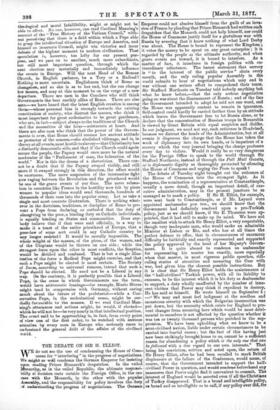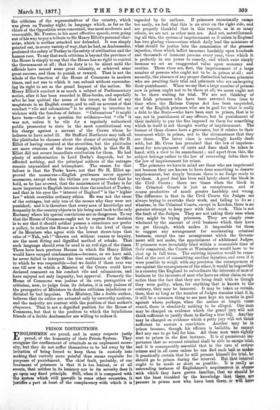THE DEBATE ON SIR H. ELLIOT.
NVE do -not see the use of condemning the House of C• MOW3. for " interfering" in the progress of negotiations. We mighe as will condemn the German Emperor for insisting upon reading. Prince Bismarck's despatches. In the veiled Monarchy, as ii the veiled Republic, the ultimate responsi- bility of decision rests outside the Foreign Office, in the- one ease with the Monarch, in the other with the popular Assembly, and the responsibility for policy involves the duty of understanding. the progress of negotiations. The German Emperor could not absolve himself from the guilt of an inva- sion of France by pleading that Prince Bismarck had written such despatches that the Monarch could not help himself, nor could the House of Commons justify itself for a gratuitous war with Russia by averring that it knew nothing of what Lord Derby was about. The House is bound to represent the Kingdom ; it votes the money to be spent on any great enterprise ; it is regarded by the people as the ultimate authority, and when grave events are toward, it is bound to interfere. As a matter of fact, it interferes in foreign politics with ex traordinary reluctance. The barest statement that seetecy is " to the interest of the public service shuts every mouth, and the only ruling popular Assembly in the world submits to hear of negotiations which may end in war without one serious effort to comprehend their tenor. Sir Stafford Northoote on Tuesday told nobody anything bit what he knew before,—that the only serious negotiation going on was about the disarmament of Russia ; and of the line the Government intended to adopt he said not one word, and the House was apparently content to remain in ignorance. Self-control could hardly be carried farther than by an attitude which leaves the Government free to let Russia alone, or to declare that the concentration of Russian troops in Bessarabia is viewed by Great Britain with equal suspicion and disbire. In our judgment, we need not say, such reticence is ill-advised, because we distrust the heads of the Administration, but at all events it disproves the charge that the House has taken the work of diplomacy into its own hands, or is impatient of a secrecy which the very journal bringing the charge professes every day to violate. Would it really be so very dangerous for the Foreign Office to speak to the world through Sir Stafford Northoote, instead of through the Pall Mall Gatette, or is diplomatic dignity so thoroughly protected by silencing the House of Commons and urging the Press to speak ?
The debate of Tuesday night brought out the reticence of the House of Commons into the strongest light. As It happens, the nomination of a representative at Constantinople, usually a mere detail, though an important detail, of exe- cutive administration, may in the present juncture be so managed as to mark a policy. If Sir H. Elliot, for example, were sent back to Constantinople, or if Mr. Layard were appointed ambassador pro tem., we should know that the Government had definitely resolved upon a pro-Turkish policy, just as we should know, if Sir E. Thornton were ap- pointed, that it had still to make up its mind. We have not the smallest wish to attack Sir Henry Elliot, a very respectable, though very inadequate man, who would make an admirable Minister at Lisbon or Rio, and who has at all times the perfect defence to offer, that in circumstances of enormous difficulty he faithfully and exactly represented and supported the policy approved by the head of her Majesty's Govern- ment. It is quite absurd to condemn an ambassador for representing his master too exactly, more especially when that master, in most vigorous public speeches, ridi- culing stories of atrocities and menacing the Czar With war, had given him the clearest possible instructions. Bat it is clear that Sir Henry Elliot holds the maintenance of the " half-civilised" Turkish power, with all its liability to excesses, to be the interest which it is his duty as Ambassador to support, a duty wholly unaffected by the number of inno- cent victims that Power may think it expedient to destroy. He has said so himself. He wrote himself on September 4 : —" We may and must feel indignant at the needless and monstrous severity with which the Bulgarian insurrection was put down, but the necessity which exists for England to pre- vent changes from occurring here which would be most detri- mental to ourselves is not affected by the question whether it was ten or twenty thousand persons who perished in the sup-. pression. We have been upholding what we know to be a ;carried nation, liable under certain circumstances to be ;carried into fearful mess ; but the fact of this having just now been strikingly brought home to us, cannot be a sufficient reason for abandoning a policy whieh is the only one that can be followed with a due regard to our own interests." That being his conviction, written and sated upon, the return of Sir Henry Elliot, after he had been recalled to mark British displeasure at the failure of the Conference, would mean, of course, that the Government intended to support the half- civilised Power in question, and would condone beforehand any massacres that Power might find it convenient to commit. The interest of England would be asserted even if all the Cluietiate of Turkey disappeared. That is a broad and intelligible policy, so broad and so intelligible as to call, if any policy ever did, for the criticism of the representatives of the country, which was given on Tuesday night, in language which, as far as the chiefs of the Opposition were concerned, was most moderate and reasonable, Mr. Forster, in his most effective speech, even going out of his way to pay a tribute to Sir Henry Elliot's personal char- acter, which is neither attacked nor defended. It was simply pointed out, in every variety of way, that he had, as Ambassador, preferred the safety of Turkey to the safety of civilisation and the human race. To say that such criticism is beyond the province of the House is simply to say that the House has no right to control the Government at all; that its duty is to be silent until the officials have caused some great calamity, or achieved some great success, and then to punish or reward. That is not the whole of the function of the House of Commons in modern times, and not one to which it can submit without surrender- ing its right to act as the grand Inquest of the nation. Sir Henry Elliot's conduct is as much a subject of Parliamentary notice, after it has been recorded in Blue-books, and especially after he has quitted the scene of his errors, as that of any magistrate in an English eounty, and to call an account of that conduct " vile and calumnious " is to attempt to interfere by violence with the freedom of debate. " Calumnious" it might have been—that is a question for evidence----but " vile " it woe not, unless it be vile for a regularly authorised public prosecutor to state in the most constitutional way his charge against a servant of the Crown whom he believes to have acted ill. Sir Stafford Northcote may talk all the platitudes he chooses about the shame of accusing Sir H. Elliot of having connived at the atrocities, but the platitudes are mere evasions of the true charge, which is that Sir H. Elliot did not secure immediate retribution for them. He had plenty of authorisation in Lord Derby's despatch, but he effected nothing, and the principal authors of the outrages remain unpunished and triumphant. The reason for that failure is that the Turks knew, not that Sir H. Elliot ap- proved the massacres—English gentlemen never approve massacres, except when the victims are negroes—but that he held, as he has avowed, that the maintenance of Turkey is far more important to English interests than the conduct of Turkey, and that in his eyes the " interest of England " is the " higher law" which overrides ordinary ethics. He was not the cause of the outrages, but only one of the causes why they were not punished; and it is therefore that every man of knowledge and humanity in the country objects to his being sent back to the only Embassy where his special convictions are so dangerous. To say that the House of Commons ought not to express that decision is to say that it should neither possess a conscience nor prefer a policy, to reduce the House- as a body to the level of those of its Members who agree with the lowest street-boys that cries of " Yah, yah 1" thrown out without reason or inquiry, are the most fitting and dignified method of rebuke. That such language should even be used is an evil sign of the times. There have been previous Houses in which Sir Henry Elliot would have escaped condemnation,because, as we have said, he never failed to interpret the true sentiments of the Office to which he was responsible—but we doubt if there ever was one till now in which a Minister of the Crown could have declared comment on his conduct vile and calumnious, and have enjoyed not only impunity, but approval. Formerly the House of Commons was jealous of its own prerogative of criticism, now, to judge from its debates, it is only jealous of the prerogative of Ministers to declare criticism injudicious or dictated by bad impulses. The Ministry, like a feeble author, believes that its critics are actuated only by unworthy motives, and the majority are content with the position of that author's, c/aqueur.s. That is not a dignified position for the House of Commons, but that is the position to which the injudicious, friends of a feeble Ambassador are willing to reduce it.



































 Previous page
Previous page